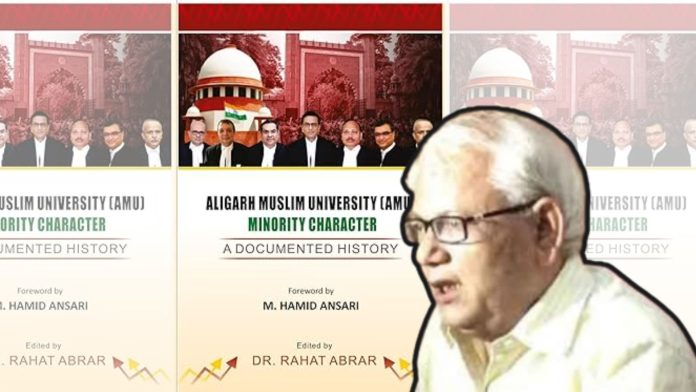Aligarh: The question of Aligarh Muslim University’s minority character has resurfaced strongly after the recent Supreme Court judgment, and a new book by Dr Rahat Abrar provides valuable insights into the issue.
Titled Aligarh Muslim University Minority Character: A Documented History, the book compiles 22 essays from historians, jurists, and activists who have studied the institution’s origins and its long-standing struggle for minority recognition. Dr Abrar, a senior historian of AMU, underlined that the Supreme Court’s latest ruling rightly noted that incorporation by legislation does not nullify an institution’s minority status. The final verdict on AMU’s status will now be decided by a larger bench.
The book stresses that AMU’s roots lie in the vision of Sir Syed Ahmad Khan and the Muslim community who mobilised resources to establish the Mohammedan Anglo Oriental College in 1877. It highlights archival evidence, including Sir Syed’s correspondence, and research by scholars such as Gail Minault and David Lelyveld, showing that AMU was created by Muslims with the purpose of advancing modern education.
Dr Abrar also reminded that the AMU Act of 1920 explicitly states that the university was established by Muslims for Muslims, while keeping its doors open to all. He noted that the institution’s first graduate was a Hindu, Ishwari Prasad, and many Hindu scholars taught at the university, which underlines its inclusive approach.
The volume includes contributions from jurists like A.G. Noorani and Dr Tahir Mehmood, as well as lawyers Faizan Mustafa and Salman Khurshid, who have been central in the legal battle. A foreword by former Vice President M. Hamid Ansari adds further weight to the collection.
Priced at Rs 999 and published by Naamak Publications, New Delhi, the book (available on Amazon) offers an important reference for Muslims seeking to understand AMU’s history and its ongoing legal struggle.




